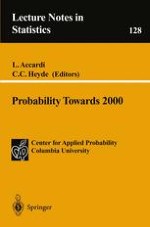1998 | OriginalPaper | Buchkapitel
Decoupling Inequalities: A Second Generation of Martingale Inequalities
verfasst von : Victor H. De La Peña
Erschienen in: Probability Towards 2000
Verlag: Springer New York
Enthalten in: Professional Book Archive
Aktivieren Sie unsere intelligente Suche, um passende Fachinhalte oder Patente zu finden.
Wählen Sie Textabschnitte aus um mit Künstlicher Intelligenz passenden Patente zu finden. powered by
Markieren Sie Textabschnitte, um KI-gestützt weitere passende Inhalte zu finden. powered by
The theory of martingale inequalities has been central in the development of modern probability theory. Recently this theory has been expanded widely through the introduction of decoupling inequalities, which provide natural extensions in cases where the variables take values in general spaces or when a martingale structure is not available. Typically, decoupling inequalities are used to transform problems involving sums of dependent random variables into problems involving sums of (conditionally) independent random variables. This transformation particularly permits the use of traditional results when dealing with sums of dependent variables. In this paper an account of the theory of decoupling inequalities is given with emphasis on its relations to the theory of martingale inequalities, and its applications and extensions to a wide range of problems, including best constants on martingale inequalities, stopping time problems, U-statistics, random graphs, quadratic forms and stochastic integration.
